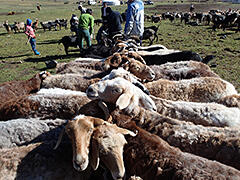Epidemiological Studies on Animal Protozoan Diseases in Mongolia and Development of Effective Diagnostics Measures
Principal Investigator
-


Prof.
Obihiro University of Agriculture and Veterinary Medicine
YOKOYAMA Naoaki


Dr.
Director, Institute of Veterinary Medicine, Mongolian University of Life Sciences
Badgar Battsetseg
ODA Recipient Country
Mongolia
Research Institutions in Japan
Obihiro University of Agriculture and Veterinary Medicine
Research Institutions in Counterpart Country
Institute of Veterinary Medicine (IVM), etc.
Adoption fiscal year
FY 2013
Research Period
5 Years
Overview of the Research Project
Identify protozoan diseases endemic to Mongolia and develop simple and rapid diagnostic kits
Trypanosomosis, piroplasmosis, and many other animal protozoan diseases are severely epidemic in Mongolia, causing chronic diseases in livestock. This is a particularly serious issue, as a large proportion of the population owes its livelihood to livestock farming. This project will produce distribution maps of trypanosomosis, piroplasmosis, and of the ticks that are vectors for piroplasmosis. Based on analyses of antigen genes of the field isolates of the parasites, the project is also attempting to develop simple and rapid diagnostic kits, and aims to collect research resources of use in determining countermeasures for infectious diseases.
Mongolian strategies to control protozoan diseases will be the first model in the world!
If the diagnostic kits for trypanosomosis and piroplasmosis are widely adopted in Mongolia, they can contribute to promotion of the livestock industry by fighting animal protozoan diseases. Moreover, if they are used to conduct epidemological surveys of protozoan diseases in Mongolia and establish a strategy to cope with such diseases, the experience will be an extremely valuable practical model for considering how to control protozoan diseases on a global scale.
Photo gallery
Research Project Web site
Press Release
Links
Projects
Contact Us
Japan Science and Technology Agency (JST)
Department of International Affairs
SATREPS Group
TEL : +81-3-5214-8085
Related articles by Category
- Infectious Diseases Control
Infectious Diseases Control

 Kingdom of Thailand
Kingdom of Thailand
Helping Tuberculosis Patients: Strengthening TB Control Strategies through Genomic Analysis!
Integrative Application of Human and Pathogen Genomic Information for Tuberculosis Control
- Mongolia
Bioresources

 Mongolia
Mongolia
Boost the sustainability of Mongolian livestock farming using traditional knowledge of nomadic Mongolians
Restoration of Pastureland by Effective Usage of Wild Forage Plants based on Traditional Knowledge of Nomadic Mongolians
- Asia
Environment / Energy
(Carbon Neutrality)
 Socialist Republic of Vietnam
Socialist Republic of Vietnam
Regenerating cassava farm land by storing carbon in the soil!
Transforming the Cassava Production System in Vietnam by Establishing Regenerative Farming and Smart Starch Supply Chain Management
- SDGs : Goal.3
Environment / Energy
(Global-scale environmental issues)
 Kyrgyz Republic
Kyrgyz Republic
Assessing air pollution throughout the Kyrgyz Republic using satellites and regional chemical transport modeling
Development of a Satellite Data and a Regional Chemical Transport Modeling-based Air Pollution Assessment System and Formation of a Research Center for Air Pollution Studies


















